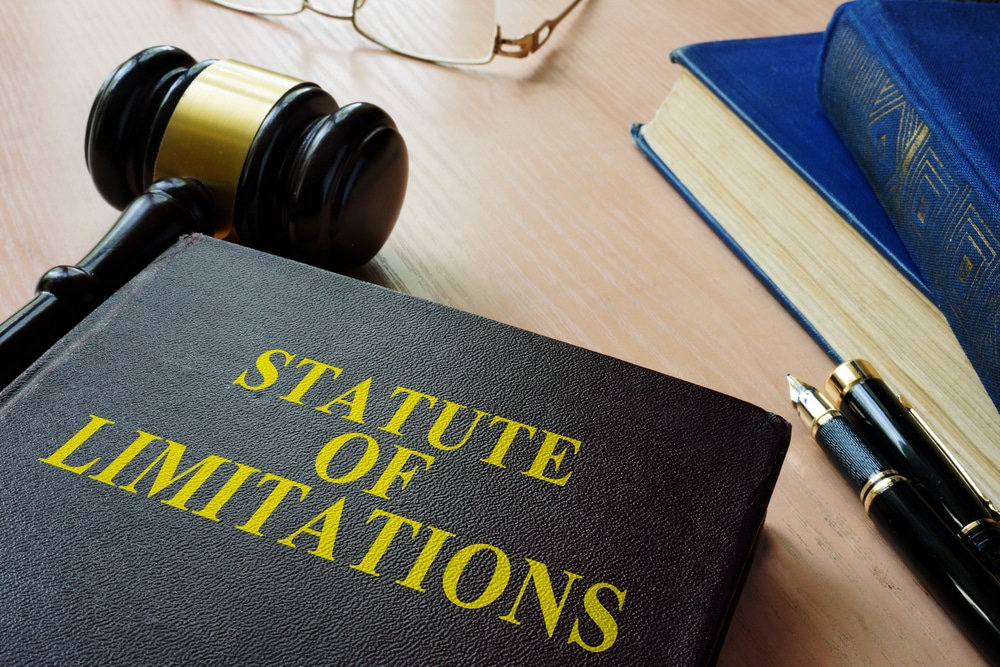Maryland Personal Injury Statute of Limitations

Time is of the essence for your personal injury case. While it is understandable that you may want to recover and regroup following your accident, you may not have that luxury. The clock is always ticking, and it could eventually cost you.
Due to the statute of limitations, you must take legal action as soon as possible. The statute of limitations could be the singular reason why your lawsuit fails. Take the time to understand it and how it could affect your case by continuing with the rest of this article.
What Is Maryland’s Personal Injury Statute of Limitations?
To start our deep dive into Maryland’s statute of limitations, let’s first define it.
The statute of limitations is a time limit set by the law that determines how much time an individual has to take legal action. You can think of it like the deadlines you had to follow back when submitting school projects. Since we are talking about the personal injury statute of limitations, we are referring specifically to how long a plaintiff has to file a lawsuit against someone who harmed them.
Notably, states handle these statutes differently. Some states have short deadlines, while others give plaintiffs ample time to assemble their lawsuits. For example, a plaintiff may only have a year to file their case in Louisiana. Meanwhile, North Dakota extends the statute of limitations to six years. Maryland residents have three years to file a lawsuit in court for a personal injury case.
Although the limits for filing lawsuits in Maryland may seem long, those years can go by quickly. Make sure you can file your case on time by hiring a personal injury lawyer.
Wrongful Death Statute of Limitations
A wrongful death is a type of personal injury case wherein the affected party dies from their injuries. These cases are different because the injured party is no longer seeking compensation. Instead, the party filing for compensation is someone related to the decedent.
Maryland law permits the decedent’s spouse, parent, or child to recover damages from the party responsible for the wrongful death.
Under almost all circumstances, the statute of limitations for a wrongful death lawsuit in Maryland is also three years from the date of the accident or intentional act that caused the death.
When Does the Maryland Statute of Limitations Begin?
In most Maryland personal injury cases, plaintiffs have three years from the date of the accident or an intentional act that caused an injury or death to file their lawsuits. For example, If you were involved in a car accident on January 30, 2023, you would have until January 30, 2026 to file your lawsuit.
However, there are rare circumstances when this three-year rigid timeline can be extended.
Always be mindful of how much time you have left to file your claim. Again, working with a personal injury attorney will help you get the ball rolling quickly.
What if You Miss the Deadline for Filing a Claim in Maryland?
Following your accident, you may have decided to focus solely on your recovery. As a result, you underwent surgical procedures and lengthy rehab stints to regain your pre-accident condition. Thankfully, all your efforts worked, and you feel like your old self again.
There is nothing wrong with taking time to recover from an accident. We recommend it to anyone who has sustained injuries. That said, you cannot focus only on recovery and neglect your case altogether. Doing so will likely cause you to miss the filing deadline for your personal injury lawsuit.
Why is it a big deal if you miss the filing deadline for your claim? It is a big deal because your claim will go nowhere if you wait for that long.
As soon as the defendant receives notice of your significantly delayed lawsuit, they can head to court and file a motion to have it dismissed. In all likelihood, the court will side with them too.
They will most likely dismiss a delayed claim no matter how much evidence you have gathered or how severe your injuries are. Because you exceeded the statute of limitations, the court has no option but to dismiss your claim at the defendant’s request.
Why Are Personal Injury Claims Dismissed if They Exceed the Statute of Limitations?
After gathering so much evidence to bolster your claim, you may find the court’s decision to dismiss it unfair even if you exceeded the statute of limitations. Then again, the court will argue that allowing you to proceed with the claim is unjust.
Courts dismiss those delayed claims because they believe something might have compromised the quality of evidence. For example, documents may have faded or suffered damage due to prolonged exposure. Witness statements may also become less reliable because the people testifying have forgotten important details. Some witnesses who could have vouched for the defendant may have also died in the years since the incident.
Given the questionable quality of evidence, courts are reluctant to let those cases proceed.
You can say you have done a good job preserving your evidence, but that may not amount to much. Because you waited too long, the court may still dismiss your lawsuit.
What Is Maryland’s “Discovery Rule” Exception?
The starting date for the statute of limitations is usually the day of the plaintiff’s accident. We say “usually” because of the discovery rule.
If a plaintiff only learns about an injury caused by another party well after the date of the incident, they will have more time to file their lawsuit. More specifically, their countdown will only begin from the day they discover their injury.
For example, you may have only learned that the defective medication you were taking caused you to develop an illness a year after you started using it. In that scenario, your countdown will begin from the day you learned about your illness and not a year earlier.
The countdown also has a delayed start for minors and individuals declared mentally incompetent. For minors, the countdown will only begin on the day they turn eighteen. The statute of limitations will only become a factor for mentally incompetent individuals after they have been deemed competent.
Is It Possible to Extend the Timeline?
The statute of limitations for personal injury cases is clearly defined, but it is not an absolute deadline. Plaintiffs can highlight certain factors affecting their case and explain why they should receive an extension.
You may be given an extension if you can prove to the court that the defendant concealed essential facts about the case. For instance, an establishment owner may have destroyed video evidence that could have proved your slip and fall accident was not your fault. Unfortunately, that fact may have only come to light years after one of their employees mentioned it to you.
Some defendants may also resort to fleeing. Such is the case with hit-and-run accidents. As the plaintiff, you can request an extension because finding your assailant took a long time.
The plaintiff’s situation could also excuse the delay. The court may give you more time if you were in prison not too long ago.
What Types of Cases Does the Statute of Limitations Apply To?
All personal injury cases are subject to the statute of limitations. Specific cases affected by that law are detailed in this section of the article.
Motor Vehicle Accidents
Unsurprisingly, many personal injury claims stem from motor vehicle accidents. These claims cover car crashes, motorcycle accidents, truck collisions, and other road mishaps.
The losses a plaintiff may suffer from a motor vehicle accident can prove quite substantial. You may have serious injuries like a broken leg or a concussion after your crash.
You should also take into account property damage in motor vehicle accidents. Your car may be rendered useless after your crash, and repairing it may cost you a hefty sum.
Sue the driver responsible for causing your accident and force them to compensate you for your medical bills and repair-related expenses. Plaintiffs may also request compensation for their lost wages and any pain and suffering they experienced due to the incident.
Pedestrian Accidents
Pedestrians have a right to use sidewalks and crosswalks safely. They should not need to worry about motorists hitting them because of the right-of-way laws in place. But sadly, those laws are not always enough to protect pedestrians.
Reckless drivers will speed through crosswalks without giving a second thought to pedestrians. Careless drivers may move too close to the sidewalk and bump into pedestrians minding their business.
Act quickly if you were the pedestrian in a pedestrian accident. Chances are you have sustained significant injuries from your encounter with the motor vehicle, and you will need compensation. Enlist the help of an experienced lawyer so you can successfully recover damages.
Bicycle Accidents
Roads can be dangerous for cyclists. That is because they must share the road with drivers trying to gain an advantage however they can.
Some drivers may swerve in and out of lanes to get ahead of other vehicles. When a driver does that, they may hit a cyclist in their blind spot. Motorists may also hit cyclists accidentally while opening a door.
Note that the culprit for your bicycle accident may not be a motorist. If your bike had a faulty component that caused your crash, you should go after the manufacturer of that defective part instead.
Negligent Security
Negligent security claims stem from commercial establishments failing to keep their patrons safe.
A plaintiff might be able to sue the owner of a commercial establishment for negligent security if someone mugged them in their parking lot. The plaintiff’s claim may point to the poor lighting in the parking lot as to why their assailant could approach undetected.
These claims may also arise from an establishment failing to hire experienced security personnel. As a result, the security guards may struggle to defuse a dangerous situation due to their inexperience, thus leading to some patrons getting injured.
Premises Liability
Slip and fall accidents, dog attacks, and negligent security incidents are all examples of premises liability. If you are pursuing a premises liability claim, you are accusing the defendant of failing to keep you safe on their property. They owed you a duty of care, and you are saying they could not fulfill their obligation.
You can put forth a premises liability claim as a customer or as someone’s guest. However, trespassers are barred from seeking compensation because they were on private property unlawfully.
Wrongful or Accidental Death
Hiring a personal injury attorney is a must if you are planning to pursue a wrongful death claim. After the death of your loved one, you may not be ready to take on legal responsibilities. You are still grieving their loss and figuring out how to move forward. Managing a legal case may be the last thing you want to deal with at that time.
You will be glad to know that your attorney can take over temporarily. Let them take the lead on your case so you will not worry about exceeding the statute of limitations.
Experienced Maryland Attorney
Attorney John Leppler has a wealth of experience when it comes to personal injury cases. Lean on his experience and use it to your advantage as you move forward with your claim. Contact us at Leppler Injury Law today, and we will ensure that your personal injury lawsuit is handled promptly and properly.
